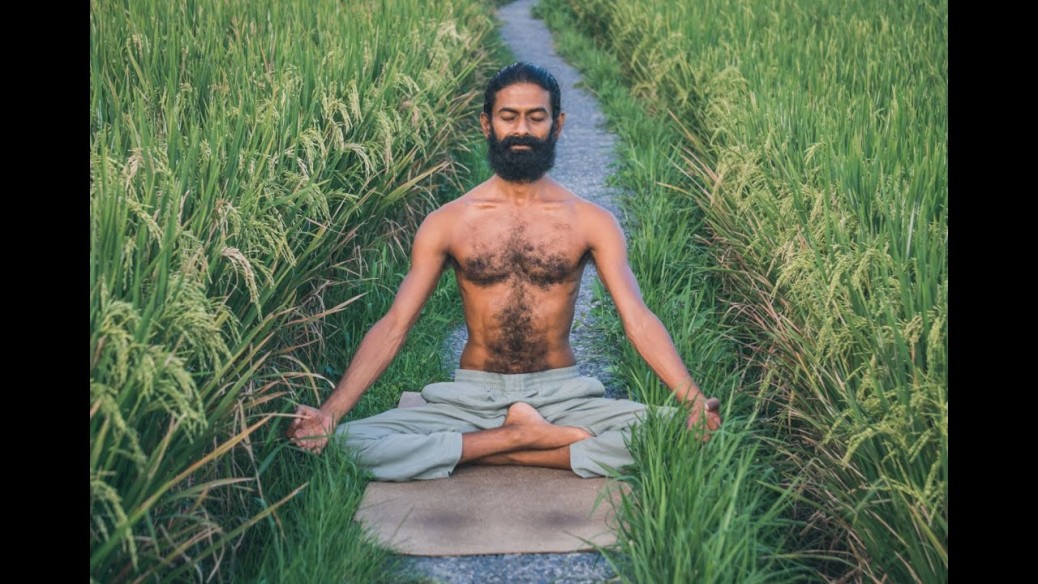OF THESE TWO, ABHYASA – THE INNER PRACTICE – IS THE EFFORT FOR BEING FIRMLY ESTABLISHED IN ONESELF. IT BECOMES FIRMLY GROUNDED ON BEING CONTINUED FOR A LONG TIME WITHOUT INTERRUPTION AND WITH REVERENT DEVOTION.
Two things. “Continuous practice for a long time.” How long? It will depend. It will depend on you, on each person, how long. The length will depend on the intensity. If the intensity is total, then very soon it can happen, even immediately. If the intensity is not so deep, then it will take a longer period.
I have heard one Sufi mystic, Junaid, was walking, just taking a walk outside his village in the morning. One man came running and asked Junaid, “The capital of this kingdom… I want to reach the capital, how long will I still have to travel? How much time will it take?”
Junaid looked at the man and, without answering him, again started walking. And the man was also going in the same direction, so the man followed. The man thought, “This old man seems to be deaf,” so a second time asked more loudly, “I want to know how much time it will take for me to reach the capital!”
But Junaid still continued walking. After walking two miles with that man, Junaid said, “You will have to walk at least ten hours.” The man said, “But you could have said that before!” Junaid said, “How can I say it? I first must know your speed. It depends on your speed. So for these two miles I was watching, what is your speed? Only then I can answer.” It depends on your intensity, your speed.
The first thing is to continue practicing for a long time without interruption. This has to be remembered. If you interrupt, if you do for some days and then leave for some days, the whole effort is lost. And when you start again, it is again a beginning.
If you are meditating and then you say for a few days there is no problem, you feel lazy, you feel like sleeping in the morning, and you say, “I can postpone, I can do it tomorrow,” – even one day missed, you have undone the work of many days, because you are not doing meditation today, but you will be doing many other things. Those many other things belong to your old pattern, so a layer is created. Your yesterday and your tomorrow are cut off. Today has become; a layer, a different layer. The continuity is lost, and when tomorrow you start again it is again a beginning. I see many people starting, stopping, starting again. The work that can be done within months, they take years.
So this is to be remembered: without interruption. Whatsoever practice you choose, then choose it for your whole life, and just go on hammering on it, don’t listen to the mind. Mind will try to persuade you, and the mind is a great seducer. It can give all kinds of reasons that today it is a must not to do it because you are feeling ill, there is a headache, you couldn’t sleep at night, you have been so tired so you can just rest today. But these are tricks of the mind.
Mind wants to follow its old pattern. Why does the mind want to follow its old pattern? Because there is less resistance; it is easier. And everybody wants to follow the easier path, the easier course. It is easy for the mind just to follow the old. The New is difficult.
So the mind resists everything that is new. If you are in practice, in abhyasa, don’t listen to the mind, you go on doing. By and by this new practice will go deep in the mind, and the mind will stop resisting it because then it will become easier. Then for the mind it will be an easy flow. Unless it becomes an easy flow, don’t interrupt. You can undo a long effort by a little laziness. So it must be uninterrupted.
And, second, with reverent devotion. You can do a practice mechanically, with no love, no devotion, no feeling of holiness about it. Then it will take very long, because through love things penetrate easily in you. Through devotion you are open, more open. Seeds fall deeper.
With no devotion you can do the same thing. Look at a temple, you can have a hired priest. He will do prayers continuously for years, with no result, with no fulfillment through it. He is doing as it is prescribed, but it is a work with no devotion. He may show devotion, but he is just a servant. He is interested in his salary – not in the prayer, not in the puja, not in the ritual. It is to be done – it is a duty; it is not a love. So he will do it, years. Even for his whole life he will be just a hired priest, a salaried man. In the end, he will die as if he has never prayed. He may die in the temple praying-but he will die as if he has never prayed, because there was no devotion.
So don’t do abhyasa, a practice, without devotion, because then you are unnecessarily wasting energy. Much can come out of it if devotion is there. What is the difference? The difference is in duty and love. Duty is something you have to do; you don’t enjoy doing it. You have to carry it on somehow; you have to finish it soon. It is just outward work. If this is the attitude, then how can it penetrate in you?
Love is not a duty, you enjoy it. There is no limit to its enjoyment; there is no hurry to finish it. The longer it is, the better. It is never enough. Always you feel something more, something more. It is always unfinished. If this is the attitude, then things go deep in you. The seeds reach to the deeper soil. Devotion means you are in love with a particular abhyasa, a particular practice.
I observe many people; I work with many people. This division is very clear. Those who practice meditation as if they are doing just a technique, they go on doing it for years, but no change happens. It may help a little, bodily. They may be more healthy; their physiques will get some benefits out of it. But it is just an exercise. And then they come to me and they say “Nothing is happening.”
Nothing will happen, because the way they are doing it is something outside, just like work – as they go to the office at eleven and leave the office at five. With no involvement, they can go to the meditation hall. They can meditate for one hour and come back, with no involvement. It is not in their heart.
The other category of people is those who do it with love. It is not a question of doing something. It is not quantitative, it is qualitative – how much you are involved, how deeply you love it, how much you enjoy it – not the goal, not the end, not the result, but the very practice.
Sufis say repetition of the name of God – repetition of the name of Allah – is in itself bliss. They go on repeating and they enjoy it. This becomes their whole life just the repetition of the name.
Nanak says, nam smaran – remembering the name is enough. You are eating, you are going to sleep, you are taking your bath, and continuously your heart is filled with remembrance. Just go on repeating “Ram” or “Allah” or whatsoever, but not as a word, as a devotion, as a love.
Your whole being feels filled, vibrates with it, it becomes your deeper breath. You cannot live without it. And by and by it creates an inner harmony, a music. Your whole being starts falling into harmony. An ecstasy is born, a humming sensation, a sweetness surrounds you. By and by this sweetness becomes your nature. Then whatsoever you say, it becomes the name of Allah; whatsoever you say, it becomes the remembrance of the divine.
Any practice WITHOUT INTERRUPTION AND WITH REVERENT DEVOTION… for the western mind it is very difficult. They can understand practice; they cannot understand REVERENT DEVOTION. They have completely forgotten that language. Western seekers come to Osho and they say, “Whatsoever you say we will do,” and they follow it exactly as it is said. But they work on it just as if they were working on any other know-how, a technique. They are not in love with it; they have not become mad; they are not lost in it. They remain manipulating.
They are the master, and they go on manipulating the technique just as any mechanical device they will manipulate. Just as you can push the button and the fan starts – there is no need for any reverent devotion for the button or for the fan. And everything in life you do like that, but abhyasa cannot be done that way. You have to be so deeply related with your abhyasa, your practice, that you become secondary and the practice becomes primary, that you become the shadow and the practice becomes the soul – as if it is not you who is doing the practice. But the practice is going on by itself, and you are just a part of it, vibrating with it. Then it may be that no time will be needed.
With deep devotion, results can follow immediately. In a single moment of devotion, you can undo many lives of the past. In a deep moment of devotion, you can become completely free from the past.
But it is difficult to explain it, that reverent devotion. There is friendship, there is love, and there is a different quality of friendship plus love which is called reverend devotion. Friendship and love exist between equals. Love between opposite sex, freindship with the same sex, but on the same level – you are equals.
Compassion is just the opposite of reverent devotion. Compassion exists from a higher source towards a lower source. Compassion is like a river flowing from the Himalayas to the ocean. A Buddha is – compassion. Whosoever comes to him, his compassion is flowing downwards. Reverence is just the opposite, as if the Ganges is flowing from the ocean towards the Himalayas, from the lower to the higher.
Love is between the equals, compassion from the higher to the lower; devotion is from the lower to the higher. Compassion and devotion both have disappeared; only friendship has remained. And without compassion and devotion friendship is just hanging in between, dead, because two poles are missing. And it can exist, living, only between those two poles.
If you are in devotion, then sooner or later compassion will start flowing towards you. If you are in devotion, then some higher peaks will start flowing towards you. But if you are not in devotion, compassion cannot flow towards you, you are not open to it.
All abhyasa, all practice, is to become the lowest so the highest can flow in you – to become the lowest. As Jesus says, “Only those who stand last will become the first in my kingdom of God.”
Become the lowest, the last. Suddenly, when you are the lowest, you are capable of receiving the highest. And to the lowest depth only is the highest attracted, pulled. It becomes the magnet. “With devotion” means you are the lowest. That is why Buddhists choose to be beggars,, Sufis have chosen to be beggars – just the lowest, the beggars. And we have seen that in these beggars the highest has happened.
But this is their choice. They have put themselves in the last. They are the last ones – not in competition with anybody, just valley-like, low, lowest.
That’s why, in the old Sufi sayings it is said, “Become a slave of God” – just a slave, repeating his name, constantly thanking him,, constantly feeling gratitude, constantly filled with so many blessings that he has poured upon you.
And with this reverence, devotion, uninterrupted abhyasa, practice. Patanjali says these two, vairagya and abhyasa, help the mind to cease. And when the mind ceases you are, for the first time, really that which you are meant to be, that which is your destiny.
Tags: Patanjali Yoga Sutra 4.2 Abhyasa










